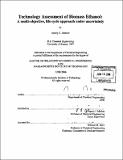Technology assessment of biomass ethanol : a multi-objective, life cycle approach under uncertainty
Author(s)
Johnson, Jeremy C. (Jeremy Clayton)
DownloadFull printable version (25.99Mb)
Other Contributors
Massachusetts Institute of Technology. Dept. of Chemical Engineering.
Advisor
Gregory J. McRae.
Terms of use
Metadata
Show full item recordAbstract
A methodology is presented for assessing the current and future utilization of agricultural crops as feedstocks for the production of transportation fuels, specifically, the use of corn grain and stover for ethanol production. The generic methodology integrates chemical process design and decision analysis tools. Four primary concepts are incorporated to address the performance of technologies and policies: 1) expansion of the system boundaries to include the entire process life cycle, 2) incorporation of both economic and environmental metrics for multi-objective optimization with tradeoff analysis using Pareto curves, 3) explicit incorporation of uncertainty analysis using Bayesian updating, and 4) integration of multiple feedstocks, processes, and products, in a network optimization framework, with subsequent decomposition to more refined models, for an improvement assessment of specific research and development goals. The first step is an assessment of the emerging corn grain ethanol industry in the U.S. Using life cycle assessment with Bayesian uncertainty propagation, the net energy balance of corn grain ethanol production is calculated and shown to be slightly positive. (cont.) The variability in the system suggests that this variance is dependent primarily on corn production location, distribution requirements, and ethanol conversion and purification efficiency lead to the significant variance. From an economic performance, an optimized facility can produce ethanol competitively with gasoline at $55/barrel, on an unsubsidized and energy equivalent basis. The life cycle greenhouse gas emissions decrease of - 5% - 30% between gasoline and ethanol on a miles driven basis. A potential modification to the process is the use of an alternative feedstock, such as lignocellulosic waste and residues, which have larger resource availability and lower economic cost. Compared to the original case, cellulosic ethanol would have a higher net energy ratio with lower greenhouse gas emissions, but the current projected economic costs are prohibitive. An improvement analysis of potential technology advancements using multiple object network optimization across the entire supply chain suggests that research and development should focus on feedstock logistics and the pretreatment stage.
Description
Thesis (Ph. D.)--Massachusetts Institute of Technology, Dept. of Chemical Engineering, 2006. Includes bibliographical references (p. 210-219).
Date issued
2006Department
Massachusetts Institute of Technology. Department of Chemical EngineeringPublisher
Massachusetts Institute of Technology
Keywords
Chemical Engineering.